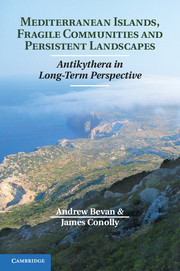 Mediterranean Islands, Fragile Communities and Persistent Landscapes
Mediterranean Islands, Fragile Communities and Persistent Landscapes Book contents
- Frontmatter
- Dedication
- Contents
- Figures and Colour Plates
- Tables
- Acknowledgements
- Abbreviations
- 1 Problems and Perspectives
- 2 Methods and Data
- 3 A Mediterranean and Island Environment
- 4 Material Worlds
- 5 Landscape Archaeology and Historical Ecology I
- 6 Landscape Archaeology and Historical Ecology II
- 7 Mobility and Investment
- 8 The Eccentric, the Specialist and the Displaced
- 9 Antikythera in Context
- Appendix I Statistical and Computational Methods
- Appendix II Locations by Period
- Miscellaneous Endmatter
- Notes
- Bibliography
- Index
9 - Antikythera in Context
Published online by Cambridge University Press: 05 July 2013
- Frontmatter
- Dedication
- Contents
- Figures and Colour Plates
- Tables
- Acknowledgements
- Abbreviations
- 1 Problems and Perspectives
- 2 Methods and Data
- 3 A Mediterranean and Island Environment
- 4 Material Worlds
- 5 Landscape Archaeology and Historical Ecology I
- 6 Landscape Archaeology and Historical Ecology II
- 7 Mobility and Investment
- 8 The Eccentric, the Specialist and the Displaced
- 9 Antikythera in Context
- Appendix I Statistical and Computational Methods
- Appendix II Locations by Period
- Miscellaneous Endmatter
- Notes
- Bibliography
- Index
Summary
This chapter brings the book to a close by briefly re-emphasising some of the major themes and challenges raised in previous chapters. Our premise has been that Antikythera's long-term record of human activity is particularly well suited to considering the relationship between particularising themes in the Mediterranean past, with their emphasis on the historical contingencies of small community life, and generalising ones, associated with island biogeography, larger-scale Mediterranean geopolitics and indeed of the globe-spanning issues of the modern world. We thus take a final opportunity to highlight how we see Antikythera offering insights about wider cultural and historical processes.
To begin, it is worth placing Antikythera's proposed fragility as a locus of human activity in its wider Mediterranean context. How does Antikythera's history compare to other islands of comparable size and/or location in the rest of the Mediterranean? As we have suggested from the outset, islands that are big enough to have seen at least one or two substantial efforts at human colonisation, but small enough to have little or no land more than a couple of kilometres from the coast, are a particularly interesting category. They are fragile places, demographically, culturally and environmentally, and rather than see this as simply stemming from insular isolation, it is worth re-stressing how this fragility holds particularly true in the often highly interactive world of the Mediterranean.
Information
- Type
- Chapter
- Information
- Mediterranean Islands, Fragile Communities and Persistent LandscapesAntikythera in Long-Term Perspective, pp. 217 - 222Publisher: Cambridge University PressPrint publication year: 2013